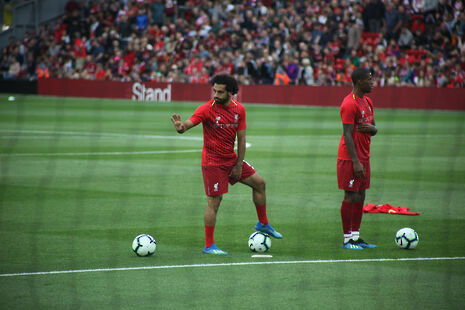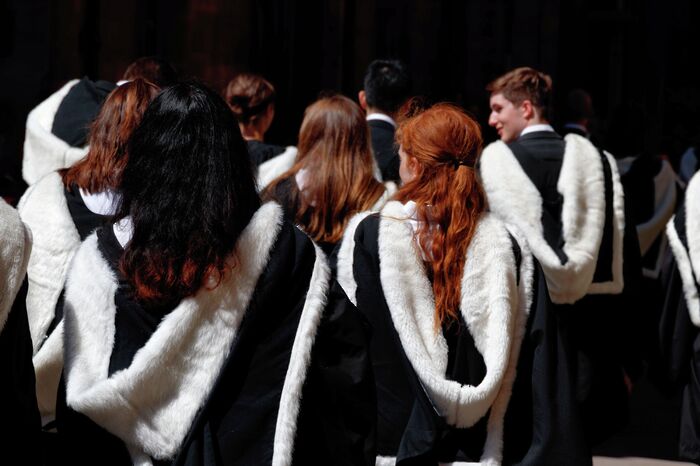Mo Salah: An inclusive symbol in an exclusive world
Kate Robertshaw explores how the face of football is changing, becoming increasingly inclusive due to the impact of players such as Mo Salah.

As an individual who is outwardly disinterested in football, I found myself on Sunday June 2nd surrounded by 750,000 ecstatic football fans. While visiting a friend in Liverpool for the weekend I couldn’t help but see the parade celebrating Liverpool’s victory in the Champions League final. A sea of red swarmed the streets of the city, as people from all walks of life joined to cheer on the victorious team, continuing their celebrations from the night before.
When the parade commenced and the bus full of footballers passed, the stirrings of the crowd rose to roars. I, too, was caught up in the excitement at seeing these individuals, as I was swept up in the frenzy of adoration for them. The contagious elation made me consider the stance of these football players, as they were praised with such force and treated as if semi-divine.
Toxic masculinity is very much still prominent in the world of football.
The history of football is intrinsically linked with its traditionally white, heterosexual male supporters, with its foundation being in 19th century England. Its potency in society has raised its players to the status of gods amongst men, and with this privilege comes also the privileging of certain characteristics. Toxic masculinity is very much still prominent in the world of football. It comes as no surprise that there is no openly homosexual man in the Premier League, and while women’s football is beginning to gain precedence in mainstream culture, their salary of £18,000 per year is minuscule compared to the average annual player salary of a male in the Premier League of £2.6 million.
In the world of sport, the notion of and stereotypes associated with male superiority come to light in the form of the promotion of aggression and repression of emotion. Footballers have traditionally succumbed to such stereotypes, with numerous high-profile players making headlines as a result of cheating scandals, fights and verbal abuse. The degradation of women and displays of physical prowess have therefore been built into some people's perception of what it means to be a man, thus reinforcing and perpetuating the stereotypes of toxic masculinity.
Some fans, too, have participated in the perpetuation of this toxic culture. Both victories and losses are often coupled with displays of violence from fans. Following England’s victory against Sweden in the 2018 World Cup, supporters took to vandalising Ikeas to celebrate. In Porto recently, ahead of England’s game against the Netherlands, fans hurled glass bottles and harassed locals, prompting riot police to the scene. Such scenes of football hooliganism have long been, and continue to be, a sub-culture of the sport and a breeding ground for toxic masculinity.
Yet the idolisation of football also has the power to bring about the opposite effects. Mo Salah, since his arrival at Liverpool in June 2017, has become an extremely important figure. His rise to football stardom, including his winning the Premier League golden boot in both of his campaigns, as well as scoring the opening goal in the recent Champions League triumph, has highlighted him as a prominent figure both in the club and in the city as a whole.
Salah has become a role model not only as a footballer, but as a Muslim.
However, Salah has become a role model not only as a footballer, but as a Muslim. He has never been shy about his beliefs and has often used football as a platform to exhibit his faith. His goal celebration involves performing sujood, the Islamic act of prostration to God, while Liverpool fans’ chants for him are ‘if he scores another few than I’ll be Muslim too’ and ‘gift from Allah’.
Salah, through his peacefulness and openness, has humanized religion and infused it into mainstream culture, exposing it to people who would otherwise not see such displays of faith. This led Stanford University to conduct research concerning Salah’s effect on Muslim culture and Liverpool. The results found an 18.9% drop in anti-Muslim hate crimes on Merseyside since Salah signed for Liverpool. No other offence had an equivalent decrease in the same period, while anti-Muslim tweets by Liverpool fans and Islamophobia online halved compared to other major Premier League clubs.
In light of these statistics, football in the city of Liverpool seems to be transforming, not into a medium for lewd and aggressive behaviour, but into a common, unifying force in which everyone has a place. That Sunday demonstrated this, as the crowds filling the streets of Liverpool were not a reflection of this culture of football hooliganism, but a united body of people. Families, couples, friends of all varieties joined in a harmonious celebration against the backdrop of one of England’s most diverse cities.
Liverpool football club hence represents a glimpse of the progressive power football possesses. The impact of Salah’s presence and the unification of the city perhaps demonstrate the future of football, a future in which football is a peaceful, safe place for everyone, not just for the white, heterosexual male.
 News / SU reluctantly registers controversial women’s soc18 December 2025
News / SU reluctantly registers controversial women’s soc18 December 2025 News / CUP announces funding scheme for under-represented academics19 December 2025
News / CUP announces funding scheme for under-represented academics19 December 2025 Features / Should I stay or should I go? Cambridge students and alumni reflect on how their memories stay with them15 December 2025
Features / Should I stay or should I go? Cambridge students and alumni reflect on how their memories stay with them15 December 2025 Fashion / The art of the formal outfit 18 December 2025
Fashion / The art of the formal outfit 18 December 2025 News / Dons warn PM about Vet School closure16 December 2025
News / Dons warn PM about Vet School closure16 December 2025










